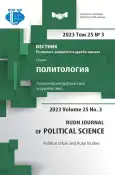The Creative Potential of the City in the Context of Digitalization
- 作者: Bardin A.L.1
-
隶属关系:
- Primakov National Research Institute of World Economy and International Relations, Russian Academy of Sciences
- 期: 卷 25, 编号 3 (2023): Political Urban and Rural Studies
- 页面: 519-538
- 栏目: POLITICAL URBAN STUDIES: THE CITY FACING NEW CHALLENGES
- URL: https://journal-vniispk.ru/2313-1438/article/view/322211
- DOI: https://doi.org/10.22363/2313-1438-2023-25-3-519-538
- EDN: https://elibrary.ru/UUTVUE
- ID: 322211
如何引用文章
全文:
详细
Limited resources, multiple crises, socio-political tensions, development imbalances, and other challenges encourage cities to search for new development resources, especially intangible ones, and policies to tap into their potential. The research considers the creative potential of the city as an intangible development resource of this kind. The study aims to analyze the significant aspects and identify the mechanisms that are promising for cities to develop their creative potential in the context of digital transformations. The author analyzes several cases, numerous program and strategic documents, reports, and publications, paying particular attention to the period of the COVID-19 pandemic. The global crisis demonstrated that organizations in the creative sector are highly vulnerable and need substantial government support. However, it also contributed to the creation of innovative products, gave impetus to the emergence of new forms of self-organization, and tailored support measures coined by the city administrations. The crisis also highlighted the crucial role of ICT tools and digital strategies in the survival and competitiveness of many organizations from the cultural and creative sectors. In this context, and considering the key industry trends, the article discusses possible points of growth and promising formats of interaction between the industry and the city administrations. In conclusion, the author suggests specific tools significant for the development of the industry, such as digital development strategies, as well as organizational practices that can contribute to the realization of the creative potential of the city.
作者简介
Andrei Bardin
Primakov National Research Institute of World Economy and International Relations, Russian Academy of Sciences
编辑信件的主要联系方式.
Email: andreybardin@gmail.com
ORCID iD: 0000-0001-9526-9763
PhD in Political Sciences, Researcher
Moscow, Russian Federation参考
- Bauman, Z. (2008). Liquid Modernity. St Petersburg: Piter. (In Russian). [Bauman, Z. (1999). Liquid Modernity].
- Curtis, M. (2016). Cities and global governance: State failure or a new global order? Millennium: Journal of International Studies, 44(3), 455–477. https://doi.org/10.1177/0305829816637233
- Douglas, M. (1986). How Institutions Think. Syracuse, N.Y.: Syracuse University Press.
- Howkins, J. (2002). The creative economy: How people make money from ideas. Penguin Global.
- Hudson, C., Nyseth, T., & Pedersen, P. (2019). Dealing with difference. City, 23(4–5), 564–579. https://doi.org/10.1080/13604813.2019.1684076
- Kara, B. (2019). The impact of globalization on cities. Journal of Contemporary Urban Affairs, 3(2), 108–113. https://doi.org/10.25034/ijcua.2018.4707
- Kochukhova, E.S., & Martianov, V.S. (2019). Creative city or right toward the city: Alternative of urban development in Russian context. Antinomies, 19(2), 5–66. (In Russian). https://doi.org/10.17506/aipl.2019.19.2.4566
- Koolhaas, R., & Mau, B. (1995). The generic city. S, M, L, XL. The Monacelli Press.
- Kostko, N.A. (2021). Models for the concept implementation of ‘creative city’: analysis of European experience”. Siberian Socium, 5, 3(17), 52–68. (In Russian). https://doi. org/10.21684/2587-8484-2021-5-3-52-68
- Kvashnin, Yu.D. (2022). European urban strategies for attracting high-skilled migrants. Social Sciences and Contemporary World, (1), 48–59. (In Russian). https://doi.org/10.31857/ S086904992201004X
- Miroshnichenko, I.V., & Morozova, E.V. (2022). Public policy as a space for converting intangible resources into factors of territorial development. Political science (RU), (3), 144–163. (In Russian). https://doi.org/10.31249/poln/2022.03.07
- Mulgan, G. (2009). The art of public strategy: Mobilizing power and knowledge for the common good. Oxford: Oxford University Press.
- Namyślak, B. (2020). Barriers to the development of creative clusters in Poland. Regional Studies, 7(1), 412–427. https://doi.org/10.1080/21681376.2020.1814853
- Pourzakarya, M., & Fadaei, Nezhad Bahramjerdi, S. (2019). A restudy of culture-led regeneration approach in creative city building: Developing an analytical framework for the regeneration of cultural and creative quarter. The Monthly Scientific Journal of Bagh-e Nazar, 16(77), 5–14. https://doi.org/10.22034/BAGH.2019.148078.3766
- Semenenko, I.S. (2019). Horizons of responsible development: From discourse to governance. Polis. Political Studies, (3), 7–26. (In Russian). https://doi.org/10.17976/jpps/2019.03.02
- Semenenko, I.S. (Ed.). (2020). The state in political science and social reality in the 21st Century. Moscow: Ves Mir. (In Russian).
- Zhuravleva, T.A. (2022). Political strategies of urban development: The crisis of vision. Political science (RU), (3), 64–180. (In Russian). https://doi.org/10.31249/poln/2022.03.08
补充文件









